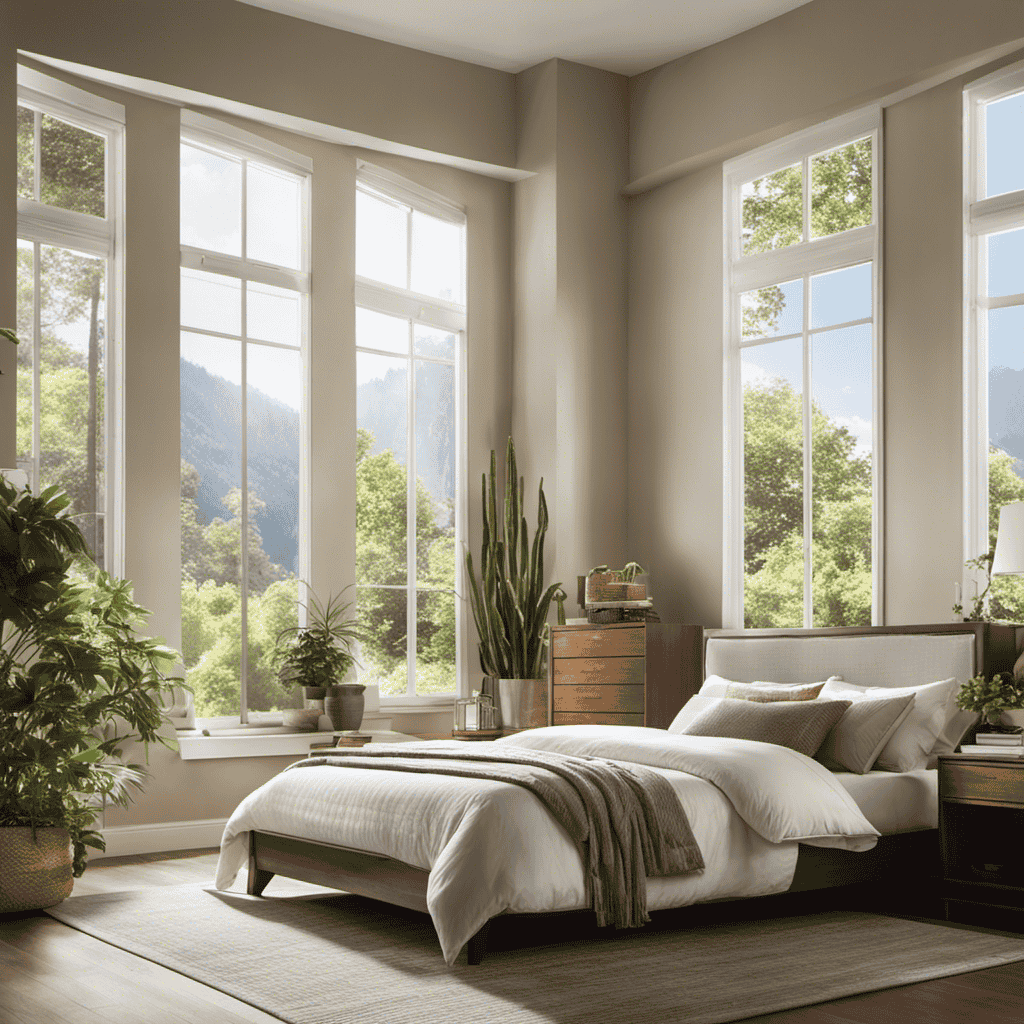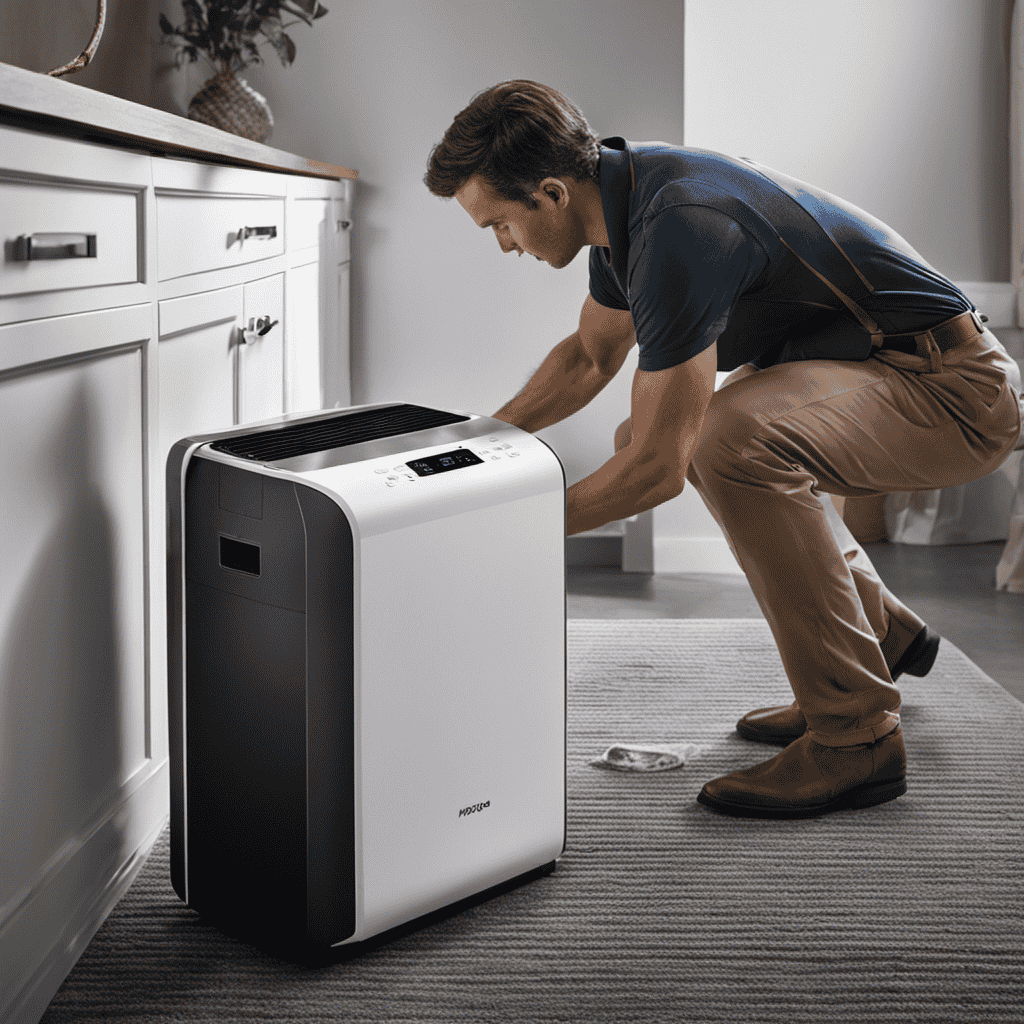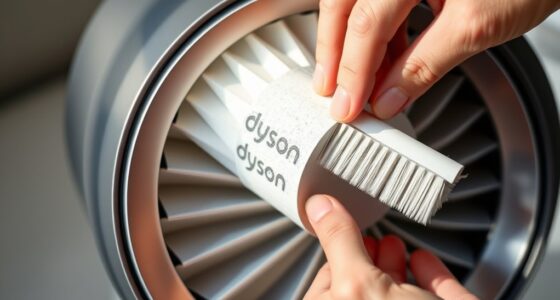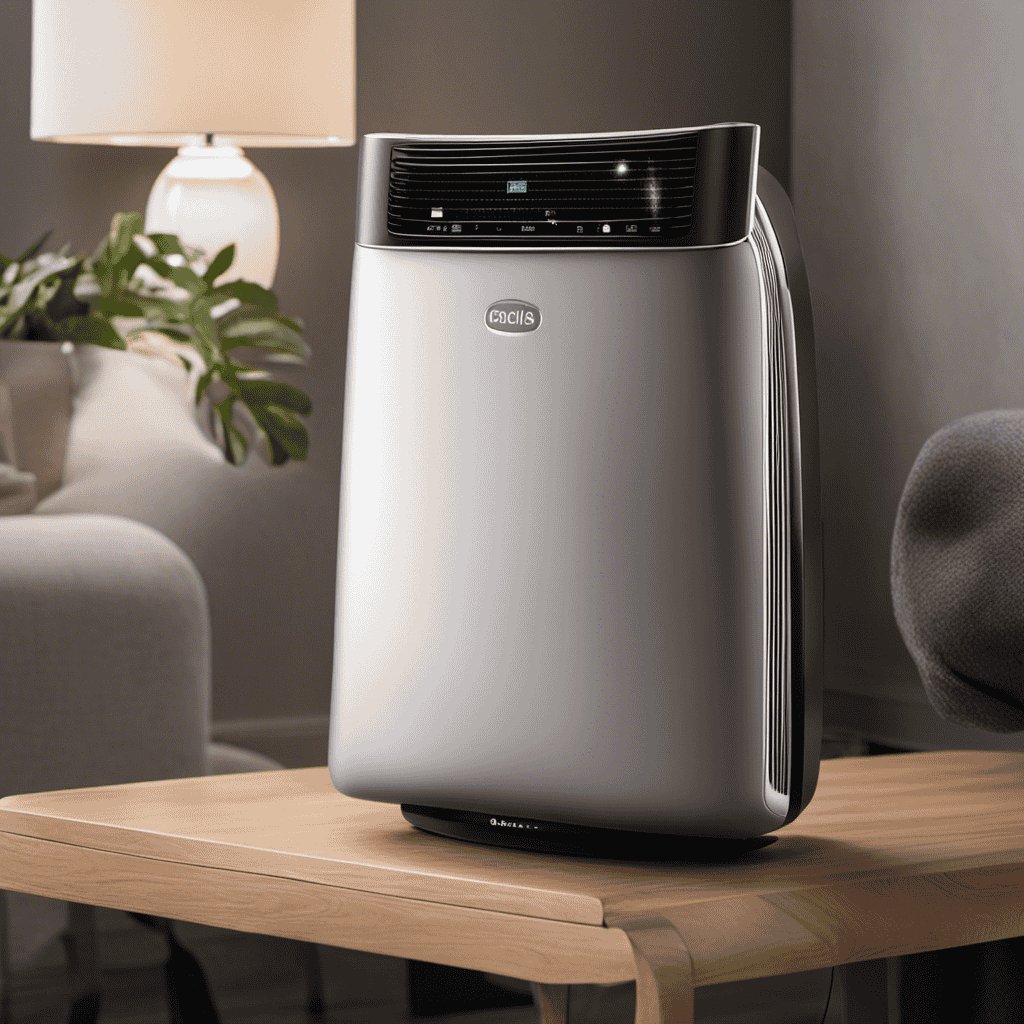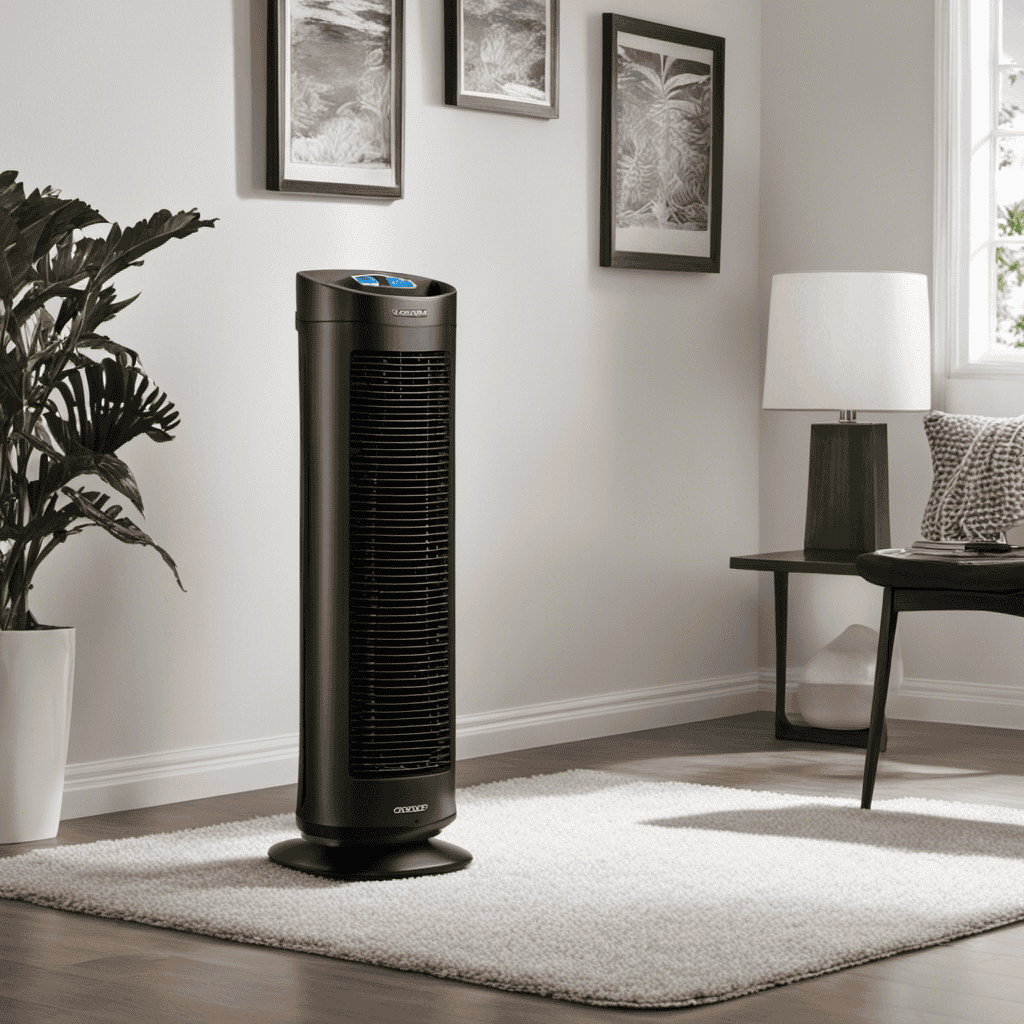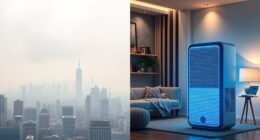As a person who prioritizes clean air and a healthy living environment, I cannot emphasize the significance of utilizing an air purifier enough.
Breathing in polluted air can have serious consequences on our health, but thankfully, there’s a solution.
In this article, I’ll delve into the health benefits of using an air purifier, the common indoor air pollutants we should be aware of, and how an air purifier can improve our indoor air quality.
So, let’s explore why investing in an air purifier is a smart and essential choice.
Key Takeaways
- Air purifiers reduce allergens and pollutants in the air, improving indoor air quality.
- They filter out harmful particles like pollen, dust, pet dander, and mold spores, making the environment healthier.
- Air purifiers eliminate bacteria, viruses, and other airborne pathogens, helping to prevent the spread of illnesses.
- Using an air purifier can improve sleep, energy levels, and overall well-being.
Health Benefits of Using an Air Purifier
Using an air purifier can help improve your overall health by reducing allergens and pollutants in the air you breathe. Air purifiers are designed to filter out harmful particles such as pollen, dust, pet dander, and mold spores. By removing these allergens from the air, they can significantly reduce allergy symptoms and respiratory issues.
Additionally, air purifiers can also trap and eliminate bacteria, viruses, and other airborne pathogens, helping to prevent the spread of illnesses. Improved air quality can also benefit individuals with asthma or other respiratory conditions, as it reduces the triggers that can exacerbate their symptoms.
Breathing cleaner air can lead to better sleep, increased energy levels, and overall improved well-being. Investing in an air purifier is a simple and effective way to enhance the air quality in your home and promote better health.
Common Indoor Air Pollutants and Their Dangers
When it comes to the air we breathe, understanding the health risks of pollutants is essential.
Pollutants such as particulate matter, volatile organic compounds, and carbon monoxide can have severe consequences on our well-being, leading to respiratory issues, allergies, and even long-term health problems.
On the other hand, clean air provides numerous benefits. It can improve lung function, reduce the risk of respiratory diseases, and enhance overall health.
Health Risks of Pollutants
Pollutants in the air can negatively impact our health. Here are three important points to consider:
-
Preventing Cardiovascular Diseases: Air pollution, especially fine particulate matter (PM2.5), has been linked to an increased risk of cardiovascular diseases such as heart attacks and strokes. These tiny particles can enter our bloodstream through inhalation, leading to inflammation and damage to blood vessels.
-
Effects of Air Pollution on Cognitive Function: Research suggests that long-term exposure to air pollution can impair cognitive function and increase the risk of neurodegenerative diseases like Alzheimer’s. Fine particles and toxic chemicals in polluted air can penetrate the blood-brain barrier, causing oxidative stress and inflammation in the brain.
-
Other Health Effects: In addition to cardiovascular and cognitive impacts, air pollution can also worsen respiratory conditions such as asthma and chronic obstructive pulmonary disease (COPD). It can trigger symptoms like coughing, wheezing, and shortness of breath, making it harder for individuals with these conditions to breathe.
It is crucial to take measures to reduce air pollution and protect our health.
Benefits of Clean Air
Clean air has numerous benefits for our overall well-being. Breathing in clean air is essential for maintaining good health. Clean air helps to reduce the risk of respiratory diseases such as asthma and allergies, as it contains fewer pollutants and irritants. It also improves our cardiovascular health by reducing the risk of heart attacks and strokes.
In addition, clean air enhances our immune system, allowing it to function properly and protect us from diseases. Moreover, clean air promotes better sleep, concentration, and productivity. It is important to prioritize clean air, both outdoors and indoors, to safeguard our health and well-being.
Transitioning into the subsequent section, one effective way to improve indoor air quality is by using an air purifier.
How an Air Purifier Improves Indoor Air Quality
An air purifier is a valuable tool for improving indoor air quality as it effectively removes harmful pollutants from the air.
By filtering out pollutants such as dust, pet dander, and mold spores, an air purifier helps to create a cleaner and healthier living environment.
Additionally, an air purifier can reduce allergens and odors, making it especially beneficial for individuals with allergies or sensitivities.
Removes Harmful Pollutants
You’ll be amazed at how harmful particles are effectively eliminated by using an air purifier. Air purifiers are highly effective at improving indoor air quality by removing pollutants such as dust, pollen, pet dander, and smoke.
Here are three reasons why air purifiers are so effective:
-
HEPA Filters: Air purifiers equipped with High-Efficiency Particulate Air (HEPA) filters can capture particles as small as 0.3 microns, ensuring even the tiniest pollutants are trapped and prevented from recirculating in your home.
-
Activated Carbon Filters: These filters are designed to adsorb and neutralize odors, chemicals, and volatile organic compounds (VOCs) present in the air, making your indoor environment fresher and healthier.
-
UV-C Technology: Some air purifiers use ultraviolet (UV) light to kill bacteria, viruses, and other microorganisms that may be present in the air, further improving the cleanliness of your indoor air.
By effectively eliminating harmful particles, air purifiers contribute to a healthier home environment and help reduce the risk of respiratory issues.
Now, let’s explore how air purifiers also reduce allergens and odors.
Reduces Allergens and Odors
After discussing how air purifiers can remove harmful pollutants, let’s now explore how they can effectively reduce allergens and odors in your indoor environment.
Air purifiers equipped with HEPA filters can capture and eliminate common allergens like pollen, pet dander, and dust mites, providing relief for allergy sufferers. Additionally, air purifiers can tackle odors caused by cigarette smoke, cooking, or pets, ensuring a fresh and pleasant-smelling home.
By filtering out these irritants and pollutants, air purifiers create a cleaner and healthier indoor space. Moreover, reducing indoor pollutants can have a positive impact on respiratory health, particularly for individuals with asthma or allergies.
Now, let’s dive deeper into the topic of allergens and asthma triggers: how an air purifier can help.
Allergens and Asthma Triggers: How an Air Purifier Can Help
If you struggle with allergies or asthma, using an air purifier can greatly reduce the presence of allergens and triggers in your home. Here are some ways an air purifier can benefit your respiratory health and effectively combat allergens:
-
Filters out airborne particles: Air purifiers are equipped with filters that trap and remove allergens such as pollen, pet dander, dust mites, and mold spores from the air. This helps to alleviate symptoms and prevent asthma attacks.
-
Removes irritants and odors: Air purifiers not only eliminate allergens but also capture and neutralize other irritants in the air, such as smoke, chemicals, and odors. This creates a cleaner and fresher environment for those with respiratory issues.
-
Improves indoor air quality: By continuously circulating and purifying the air, these devices can significantly improve the overall quality of the air you breathe. This is especially beneficial for individuals with allergies and asthma, as it reduces their exposure to triggers.
With their effectiveness against allergens and the numerous benefits they offer for respiratory health, air purifiers are a valuable addition to any home.
Eliminating Pet Dander and Odors With an Air Purifier
Living in an allergen-free space is crucial for those with allergies or asthma. By using an air purifier, you can ensure that the air in your home is fresh and clean, free from allergens and irritants that can trigger respiratory symptoms.
Improved indoor air quality not only promotes better health but also creates a more comfortable and pleasant living environment.
Allergen-Free Living Space
Creating an allergen-free living space can be achieved by using an air purifier. With the right air purifier, you can effectively eliminate odors and reduce dust in your home. Here are three reasons why an air purifier is a great tool for maintaining a clean and healthy living environment:
-
Odor elimination: Air purifiers are designed to trap and remove odorous particles from the air, such as cooking smells, pet odors, and cigarette smoke. By filtering out these particles, the air in your home will be fresher and more pleasant to breathe.
-
Dust reduction: Air purifiers equipped with HEPA filters are highly effective at capturing dust particles, including allergens like pollen, pet dander, and mold spores. This can significantly reduce the amount of dust circulating in your living space, helping to improve indoor air quality and alleviate allergy symptoms.
-
Improved respiratory health: By removing allergens and irritants from the air, an air purifier can help alleviate respiratory conditions like asthma and allergies. Breathing in cleaner air can also promote better sleep and overall well-being.
Investing in an air purifier is a proactive step towards creating a healthier and more comfortable living space, free from allergens and odors.
Fresh and Clean Air
Maintaining fresh and clean air in my home is essential for a healthy living environment. Air quality control plays a crucial role in ensuring respiratory health.
Poor air quality can lead to various health issues, such as allergies, asthma, and other respiratory problems. To improve the air quality, I have invested in an air purifier.
An air purifier helps remove pollutants, such as dust, pollen, pet dander, and mold spores, from the air, effectively reducing the risk of respiratory issues. By filtering out these harmful particles, an air purifier creates a cleaner and healthier indoor environment.
It is especially beneficial for individuals with allergies or asthma, as it helps alleviate symptoms and provides relief.
Overall, incorporating air purifiers into our homes is a proactive step towards maintaining optimal air quality and promoting better respiratory health.
Improved Indoor Air Quality
To enhance the quality of air indoors, you should regularly clean and dust your home. However, even with regular cleaning, it can be challenging to eliminate all pollutants and allergens from the air. This is where an air purifier can be beneficial.
Here are three reasons why using an air purifier can help improve indoor air quality:
-
Removes airborne particles: Air purifiers are designed to capture and filter out pollutants such as dust, pet dander, pollen, and mold spores, reducing their presence in the air you breathe.
-
Reduces indoor odors: Air purifiers with activated carbon filters can effectively remove unpleasant odors from cooking, pets, and tobacco smoke, leaving your home smelling fresh and clean.
-
Alleviates allergies and asthma symptoms: By removing allergens and irritants from the air, air purifiers can help reduce allergy and asthma symptoms, providing relief for those who suffer from these conditions.
Using an air purifier can greatly benefit your indoor air quality by reducing indoor air pollution and creating a cleaner and healthier living environment.
The Link Between Air Pollution and Respiratory Issues
Air pollution can cause respiratory issues, so it’s important to consider using an air purifier.
Respiratory diseases, such as asthma, bronchitis, and allergies, are often linked to poor air quality. Air pollution contains harmful particles and pollutants that can irritate the respiratory system and worsen existing conditions.
Investing in an air purifier can help control air pollution indoors and reduce the risk of developing or exacerbating respiratory illnesses. Air purifiers work by filtering out pollutants and allergens from the air, ensuring that the air you breathe is cleaner and healthier.
Reducing the Risk of Airborne Illnesses With an Air Purifier
Investing in an air purification system can greatly reduce the risk of airborne illnesses, ensuring that you and your family breathe cleaner and healthier air. With the increasing concern about indoor air pollution, an air purifier offers numerous benefits in improving air quality. Here are three reasons why an air purifier is worth considering:
-
Removes pollutants: An air purifier can effectively remove harmful pollutants such as dust, pollen, pet dander, and mold spores from the air, reducing the risk of allergies and respiratory issues.
-
Eliminates odors: Whether it’s cooking smells, pet odors, or tobacco smoke, an air purifier can eliminate unpleasant odors, leaving your indoor environment smelling fresh and clean.
-
Filters out bacteria and viruses: Some air purifiers are equipped with advanced filtration systems that can capture and neutralize bacteria and viruses, providing an additional layer of protection against airborne illnesses.
Investing in an air purifier is a proactive step towards creating a healthier and cleaner indoor environment, benefiting both your physical well-being and overall quality of life.
The Importance of Clean Air for Babies and Young Children
As a parent, I understand the importance of clean air for my child’s health. Allergies and respiratory issues can have a significant impact on their well-being, affecting their ability to breathe properly and enjoy daily activities.
It’s crucial to consider the developmental impact these issues can have on children and take preventive measures to avoid long-term health issues.
Allergies and Respiratory Health
If you suffer from allergies or have respiratory health concerns, using an air purifier can greatly improve your indoor air quality. Air purifiers are designed to remove allergens and pollutants from the air, creating a cleaner and healthier environment for you to breathe.
Here are three ways air purifiers can help with allergy prevention and respiratory conditions:
-
Filter out allergens: Air purifiers use filters to capture allergens like pollen, pet dander, and dust mites, reducing the presence of these triggers in your home.
-
Remove airborne pollutants: Air purifiers can also remove common indoor pollutants such as smoke, mold spores, and volatile organic compounds (VOCs), which can aggravate respiratory conditions.
-
Improve air circulation: By circulating and filtering the air, air purifiers help to reduce the concentration of allergens and pollutants, making it easier for individuals with allergies or respiratory conditions to breathe.
Developmental Impact on Children
By incorporating an air purifier into my home, I can help create a cleaner and healthier environment for my children. This can potentially mitigate the developmental impact of allergens and pollutants. The air we breathe can have a significant impact on our children’s overall well-being. This includes their developmental milestones and cognitive development.
Studies have shown that exposure to high levels of allergens and pollutants can negatively affect children’s cognitive abilities and learning capabilities. An air purifier can help create a safer and more conducive environment for learning and development by removing these harmful particles from the air.
Additionally, a cleaner and healthier indoor air can also improve sleep quality, reduce respiratory issues, and enhance overall health. This further supports optimal cognitive development. Investing in an air purifier is a proactive step towards ensuring my children’s healthy growth and development.
Preventing Long-Term Health Issues
Investing in an air purifier helps create a cleaner and healthier environment, reducing the risk of long-term health issues for my children. Here are three key benefits of using an air purifier:
-
Improved Indoor Air Quality: Air purifiers are designed to remove pollutants and allergens from the air, such as dust, pet dander, pollen, and mold spores. By filtering out these harmful particles, air purifiers can significantly improve the indoor air quality in our homes.
-
Allergy and Asthma Relief: For children with allergies or asthma, air purifiers can provide much-needed relief. By removing common triggers from the air, such as pollen and pet dander, air purifiers can help alleviate symptoms and reduce the frequency and severity of asthma attacks.
-
Reduced Risk of Respiratory Issues: Exposure to pollutants and airborne particles can lead to respiratory issues and long-term health problems. Air purifiers help eliminate these harmful substances, reducing the risk of respiratory infections, lung diseases, and other respiratory issues.
Investing in an air purifier is a proactive step towards creating a healthier and safer living environment for my children, with the added benefit of reducing the risk of long-term health issues associated with poor indoor air quality.
Removing Harmful Chemicals and Vocs From Indoor Air
Using an air purifier can help to remove harmful chemicals and VOCs from indoor air. Volatile organic compounds (VOCs) are chemicals that can be emitted from various sources like cleaning products, paints, and furniture. These compounds can have adverse effects on indoor air quality, leading to respiratory health issues.
Indoor air quality plays a crucial role in our overall well-being, especially considering that we spend most of our time indoors. Poor air quality can contribute to respiratory problems such as allergies, asthma, and even lung diseases.
How an Air Purifier Can Alleviate Seasonal Allergies
To alleviate seasonal allergies, consider opting for an air purifier equipped with high-efficiency filters. These filters are designed to capture and remove allergens such as pollen, dust mites, and pet dander from the air, reducing the chances of them entering your respiratory system and triggering an allergic reaction.
Here are three ways an air purifier can help alleviate your seasonal allergies:
-
Alleviating Congestion: By removing airborne allergens from the environment, an air purifier can help reduce congestion in your nasal passages, making it easier to breathe and reducing the discomfort caused by allergy symptoms.
-
Reducing Sinus Inflammation: Allergens can cause inflammation in the sinuses, leading to sinusitis and other respiratory issues. An air purifier can help remove these irritants from the air, reducing sinus inflammation and promoting better respiratory health.
-
Improving Indoor Air Quality: By effectively filtering out allergens, an air purifier can significantly improve the overall air quality in your home, creating a more allergy-friendly environment and reducing the frequency and severity of allergic reactions.
Investing in an air purifier with high-efficiency filters can be a valuable addition to your allergy management strategy, providing relief from congestion, reducing sinus inflammation, and improving your overall well-being.
Creating a Healthy Work Environment With an Air Purifier
Creating a healthy work environment can be achieved by incorporating an air purifier equipped with high-efficiency filters.
Air purifiers are essential tools for creating a productive workspace and increasing employee well-being. These devices work by removing harmful particles and allergens from the air, such as dust, pollen, pet dander, and mold spores.
By improving indoor air quality, air purifiers help reduce the risk of respiratory issues, allergies, and other health problems that can negatively impact employees’ well-being and productivity. High-efficiency filters trap even the smallest particles, ensuring that the air in the workspace is clean and fresh.
This promotes a healthier and more comfortable atmosphere, allowing employees to focus better, breathe easier, and work more efficiently.
Incorporating an air purifier in the workplace is a simple yet effective way to create a healthy and productive work environment.
Improving Sleep Quality and Reducing Snoring With an Air Purifier
When it comes to improving sleep quality and reducing snoring, an air purifier can be a great addition to your bedroom. I have personally experienced the benefits of using an air purifier in my sleep routine.
Here are some ways in which an air purifier can help:
-
Improving Breathing: Air purifiers are designed to remove pollutants and allergens from the air, creating a cleaner and healthier environment. This can help improve your breathing during sleep, especially if you suffer from allergies or asthma.
-
Reducing Congestion: If you often wake up with a stuffy nose or congestion, an air purifier can help alleviate these symptoms. By removing airborne particles, such as dust and pollen, an air purifier can reduce the amount of irritants in the air and help you breathe more easily throughout the night.
-
Promoting Relaxation: The white noise produced by some air purifiers can promote relaxation and mask other disruptive sounds, helping you fall asleep faster and stay asleep longer.
Overall, using an air purifier in your bedroom can contribute to a more restful and rejuvenating sleep, improving your overall well-being.
Enhancing Mental Clarity and Focus With Cleaner Air
An air purifier can greatly enhance mental clarity and focus by providing cleaner air in your environment. When the air we breathe is filled with pollutants, it can negatively impact our cognitive function and productivity. However, by using an air purifier, we can remove harmful particles and allergens from the air, improving the overall air quality and thus our cognitive abilities.
To understand the benefits of using an air purifier, let’s take a look at the following table:
| Benefit | Description | Emotional Response |
|---|---|---|
| Improved Cognitive Function | Cleaner air helps reduce brain fog and improve cognitive abilities. | Feelings of clarity and sharpness. |
| Boosted Productivity | Breathing cleaner air can increase focus and efficiency. | Motivated and energized. |
| Reduced Allergens | Purified air reduces allergens, preventing allergic reactions. | Relief and comfort. |
Preventing Mold and Mildew Growth With an Air Purifier
By incorporating an air purifier into your environment, you can prevent mold and mildew growth, improving the overall air quality. Mold and mildew thrive in damp areas, so an air purifier can help in preventing moisture buildup by reducing humidity levels in your home or office. This not only inhibits the growth of mold and mildew but also creates a healthier environment for you to breathe.
Additionally, air purifiers can be effective in reducing respiratory infections caused by airborne allergens and irritants, such as dust mites and pet dander. With cleaner air, you can breathe easier and lower your risk of respiratory illnesses.
Transitioning into the next section, let’s now explore the long-term cost savings and energy efficiency of air purifiers.
Long-Term Cost Savings and Energy Efficiency of Air Purifiers
You can save money in the long run and reduce energy consumption by choosing an air purifier with high energy efficiency ratings. When considering the long-term cost savings of an air purifier, it is important to factor in not only the initial purchase price but also the ongoing maintenance and energy usage.
Air purifiers with high energy efficiency ratings consume less electricity, resulting in lower energy bills. Additionally, these energy-efficient models often have longer lifespans, reducing the need for frequent replacements and costly repairs.
Frequently Asked Questions
How Do Air Purifiers Work?
Air purifiers work by filtering out particles and pollutants from the air, improving indoor air quality. Regular maintenance is important to ensure optimal performance. Using an air purifier has many benefits, including reducing allergies, removing odors, and promoting overall respiratory health.
Can Air Purifiers Remove All Types of Indoor Air Pollutants?
Yes, air purifiers are effective in removing common indoor air pollutants. They can remove dust, pollen, pet dander, and even some odors. However, they may not capture all types of pollutants, such as gases or chemicals.
What Size Air Purifier Do I Need for My Home?
I need to consider the size of my home when choosing an air purifier. It’s important to choose the right one to maximize the benefits of cleaner air.
Are Air Purifiers Noisy?
Air purifiers vary in noise level, but some models are designed to be quiet. It’s important to consider the noise level if you’re concerned about its impact on sleep or if you prefer a quieter environment.
Do Air Purifiers Consume a Lot of Energy?
Air purifiers do not consume a lot of energy. They are energy-efficient and have a minimal environmental impact. Using an air purifier is like having a breath of fresh air in your home.
Conclusion
In conclusion, using an air purifier is a must-have for anyone who wants to live in a world of unicorns and rainbows. Not only will it improve your health by eliminating pesky pollutants, allergens, and pet odors, but it will also transform your life into a never-ending fairytale.
Say goodbye to snoring and hello to mental clarity and focus like you’ve never experienced before. And don’t forget about the cost savings and energy efficiency!
So go ahead, embrace the magic of clean air and let the enchantment begin!
